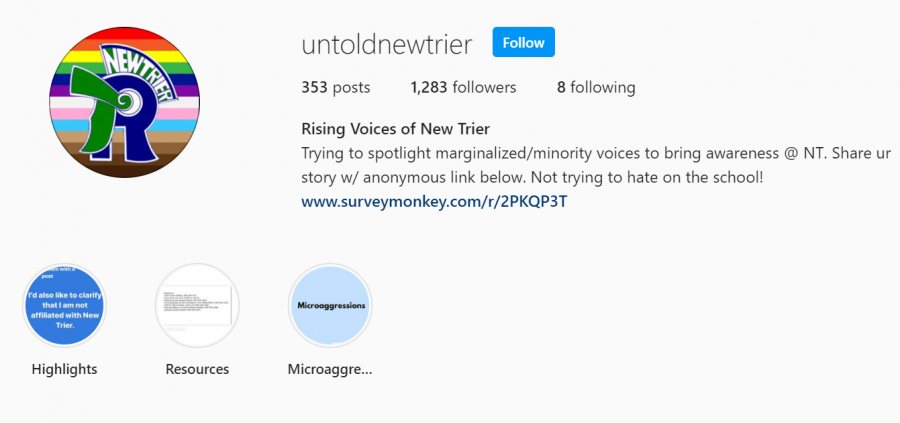Administration responds to Untold New Trier Instagram account
The account, which gives marginalized students a space to tell share their experiences, has attracted the attention of the superintendent and the principal
Over the summer, students sent their stories of discrimination to the Instagram account
On June 24, a student, who wishes to remain anonymous for their safety, posted the first story to their new Untold New Trier Instagram, an account created to spotlight marginalized students experiences. Nearly three months later, 352 students have anonymously contributed their stories to the account, which has over one thousand followers.
“I first saw a similar account made by Loyola students,” the student explained. “It made me wonder if similar acts of prejudice were going on at New Trier, so I tried to make a space where people could use their voices.”
On Untold New Trier’s page, there are detailed recollections of micro-aggressions, racial slurs, and sexual assault experiences written by students. Most accounts allegedly took place at New Trier, which surprised some students and staff.
“A lot of the stories on the account were surprising to me because I’ve never had any negative racial experiences at New Trier personally,” said senior Selena Deng. “The account broadened my awareness of the injustices some New Trier students face.”
After the site gained traction in mid-July, the account was brought to the attention of Superintendent Paul Sally, Winnetka campus Principal Denise Dubravec, and other staff members.
“It was heartbreaking to see that our students feel like they are the target of hatred at school,” said Social Studies teacher Bridget Butterly. “I think a lot of times, teachers aren’t aware of derogatory language used outside class. I’d like to say it shocks me, but it doesn’t.”
Soon after the Instagram page was launched, Dubravec met with the site creator to discuss its place in the school’s community.
“[Dubravec] told me that she had read through a lot of the stories. She wasn’t angry about the account, but welcomed the chance to hear more students’ stories, even if she wasn’t able to do a lot about them,” explained the student.
According to Sally, the administration acknowledges the student body’s desire for justice, but it doesn’t always have the ability to intervene in situations like the ones detailed in the account.
“One issue is student privacy. We are aware of the social media milieu. People are threatened and have to deal with a lot as their name comes out, and we have an obligation to the privacy of our students,” explained Sally.
The administration also faces issues posed by the anonymous format of the account.
“You have a student that gives you something anonymous, you try your best to get to it, but you can’t get back to that person to see what support they need,” explained Dubravec.
While it is impossible for the administration to retroactively resolve conflicts, especially when described anonymously, the Instagram account has had an impact on the school’s short- and long-term goals.
“Over the summer, we brought together a steering committee that had seven smaller subcommittees,” explained Sally. “They were dedicated to restorative justice, amplification of marginalized voices, and professional development, to name a few.”
According to Dubravec, the school is continuing to work on curriculum development and departmental goals.
“We want to have a more standard way that we’re dealing with sensitive issues,” explained Dubravec. “As of now, curriculum is very dependent on what Social Studies or English class a student is in, but we want it to be more uniform.”
More than anything, the administration hopes students realize that they have options beyond anonymous posts if they are confronted with acts of hatred at school.
“Our hope is that every student in the building has a trusted adult they can talk to,” said Dubravec. “We know it’s difficult, but a student’s best chance to be heard is to bring up their issue with a faculty member.”








































